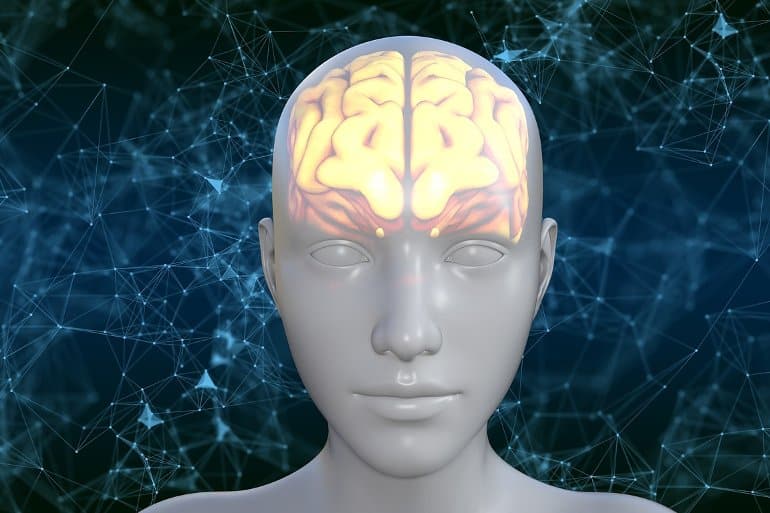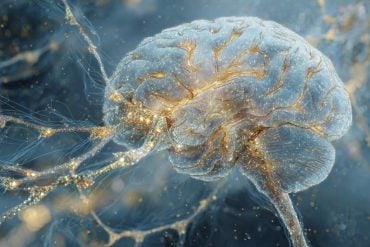Summary: Intranasal delivery of biologically active lipid messengers halts memory loss and neurodegeneration in mouse models of Alzheimer’s disease.
Source: LSU
A research collaboration between scientists at LSU Health New Orleans and the Karolinska Institutet in Sweden has found that applying specialized pro-resolving lipid mediators intranasally arrested memory loss and brain degeneration in an experimental model of Alzheimer’s Disease (AD).
The results are published in the Nature journal, Communications Biology.
Neuroinflammation is a hallmark of neurodegenerative disorders, including Alzheimer’s Disease. Specialized pro-resolving lipid mediators are bioactive compounds composed of fatty acids like omega-3 or their derivatives that resolve inflammation. Neuroprotectin D1 (NPD1), discovered by Nicolas Bazan, MD, PhD, Boyd Professor and Director of the LSU Health New Orleans Neuroscience Center of Excellence, and colleagues is one.
Previous studies by the Bazan lab demonstrated that NPD1 is protective in experimental stroke as well as retinal damage and that it is in short supply in the memory area of the brains from AD donors.
Resolving inflammation is a complex process involving mediators, cell subtypes and communication pathways. Response includes cell communications that order the activation of protective, pro-survival mechanisms and silence pro-inflammatory signaling pathways. Specialized pro-resolving lipid mediators such as NPD1 are the key signaling molecules in the process.
The paper discloses solid data on microglial activation, pro-inflammatory signaling, chronic inflammation and neuronal damage in Alzheimer’s disease. The study uses the AppNL-G-F/NL-G-F mouse model for AD. The paper extensively studied amyloid load, cognition, neuronal network oscillations, glial activation, receptors and inflammatory factors.
The authors conclude that the noninvasive administration route, intranasal delivery, of biologically active lipid messengers opens avenues for therapeutic exploration for AD and other neurodegenerative diseases.
“AD lacks prevention or cure and exerts a horrendous toll on patients and their families due to crippling progression and devastating adverse events,” notes Dr. Bazan, who led the research at LSU Health. “Millions of Americans currently suffer from AD, and the number is expected to escalate rapidly in the coming years.”

Bazan has been collaborating with Marianne Schultzberg, Senior Professor of Clinical Neuroscience at the Department of Neurobiology, Care Sciences and Society at the Karolinska Institutet (KI). Projects include looking at the novel signals that protect the brain in the cerebral spinal fluid (CSF) of the early stages of Alzheimer’s disease.
“This productive collaboration is uncovering important aspects of early stages of Alzheimer’s Disease, and the novel evolving mechanisms are promising paths for innovative therapies like the one disclosed in the current paper,” says Professor Schultzberg.
According to the National Institute on Aging, Alzheimer’s disease is currently ranked as the seventh leading cause of death in the United States and is the most common cause of dementia among older adults.
Other members of the LSU Health New Orleans research team include Drs. Khanh V. Do, Bokkyoo Jun and Megan L. Cothern. Ceren Emre, who recently completed her PhD at the Karolinska Institutet, was co-supervised by Dr. Bazan and worked at LSU Health New Orleans Neuroscience Center of Excellence for eight months just before the pandemic.
About this Alzheimer’s disease research news
Author: Leslie Capo
Source: LSU
Contact: Leslie Capo – LSU
Image: The image is in the public domain
Original Research: Open access.
“Intranasal delivery of pro-resolving lipid mediators rescues memory and gamma oscillation impairment in AppNL-G-F/NL-G-F mice” by Nicolas Bazan et al. Communications Biology
Abstract
Intranasal delivery of pro-resolving lipid mediators rescues memory and gamma oscillation impairment in AppNL-G-F/NL-G-F mice
Sustained microglial activation and increased pro-inflammatory signalling cause chronic inflammation and neuronal damage in Alzheimer’s disease (AD).
Resolution of inflammation follows neutralization of pathogens and is a response to limit damage and promote healing, mediated by pro-resolving lipid mediators (LMs).
Since resolution is impaired in AD brains, we decided to test if intranasal administration of pro-resolving LMs in the AppNL-G-F/NL-G-F mouse model for AD could resolve inflammation and ameliorate pathology in the brain.
A mixture of the pro-resolving LMs resolvin (Rv) E1, RvD1, RvD2, maresin 1 (MaR1) and neuroprotectin D1 (NPD1) was administered to stimulate their respective receptors. We examined amyloid load, cognition, neuronal network oscillations, glial activation and inflammatory factors.
The treatment ameliorated memory deficits accompanied by a restoration of gamma oscillation deficits, together with a dramatic decrease in microglial activation.
These findings open potential avenues for therapeutic exploration of pro-resolving LMs in AD, using a non-invasive route.







